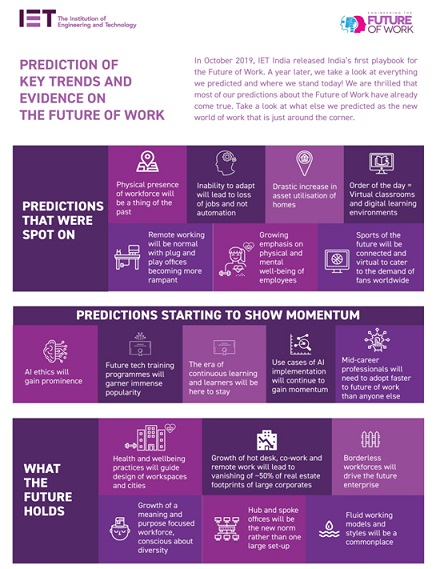Exactly 13 months back in October 2019, IET India released India’s first ever playbook for the Future of Work, a guide to navigate the changing world of work, workplace and workforce. Curated with inputs from international experts and IET’s own research, the playbook presented what the world of work will look like – in the next 3 years.
Most of predictions started coming true in just 6 months and today about 90% of the predictions are already in place. Some of the key trends predicted were – increased asset utilisation in homes, digital classrooms and virtual learning being the new norm and replacement of the physical workplaces by digital workplaces as the primary environment. You can see a complete list of predictions in the graphic below.
 |
IET India – Future of Work
Shekhar Sanyal, Country Head and Director, IET India said, “I am delighted to see that most of our predications regarding how the nature of work, workplace and workforce will shape in the future have come true, rather at an lightning speed. When we were working on the playbook, we were under the assumption that these changes would reflect in the next 2-3 years. However, the pandemic changed the tides and made future of work a new normal, rather sooner than later.
During the last few months, we have seen that the impact of future of work has varied across industries, geographies and business models and that it has already become the new normal. We can clearly see that future of work will continue to shape organisation policies and structures making the importance of IET’s Future of Work Playbook very high for decision makers. This playbook not only presents an overview of the key trends, predictions and evidences on the future of work but also provides practical insights to help organisations and management make informed decisions. We at the IET hope that this playbook will help your transition easier and help you swiftly navigate through the demands of tomorrows’ jobs.“
Anitha Kaveri, Head – Sectors and Special Projects, IET India said, “It has been a rollercoaster ride – since last October when we released the playbook. Month by month, we saw the predictions come true in front of our eyes. It only goes on to prove that the signs of this transformation were already there in the industry. The pandemic has just accelerated the whole transition and disrupted the world of work. We are excited by the opportunities these changes present and are keen to continue our work with the ecosystem players to shape future of work in India.“
A copy of IET’s Future of Work playbook is available here: bit.ly/3mHBDGn
For more information on the playbook and the findings, reach out to: India-Marketing@theiet.in
About the IET
-
We inspire, inform and influence the global engineering community to engineer a better world
-
We are a diverse home for engineering and technology intelligence throughout the world. This breadth and depth mean we are uniquely placed to help the sector progress society
-
We want to build the profile of engineering and technology to change outdated perceptions and tackle the skills gap. This includes encouraging more women to become engineers and growing the number of engineering apprentices
-
For more information, please visit: www.theiet.org
Institution of Engineering and Technology – India
The IET office started operations in India in 2006, in Bangalore. Today, we have over 13,000 members and have the largest membership base for the IET outside of the UK.
Given the increasing global importance of India as an engineering hub, our aim is to make an impact that has relevance both locally and internationally. Our strategy is to make a meaningful impact on the overall competency and skill levels within the Indian engineering community and play an influencing role with industry in relation to technology innovation and solving problems of public importance.
We want to do this through working in partnership with industry, academia and government, focussing on the application of practical skills within both learning & career lifecycles, driving innovation and thought leadership through high impact sectors.
For more details, please visit: india.theiet.org.
![]() This content comes to you under an arrangement with NewsVoir. Source
This content comes to you under an arrangement with NewsVoir. Source

